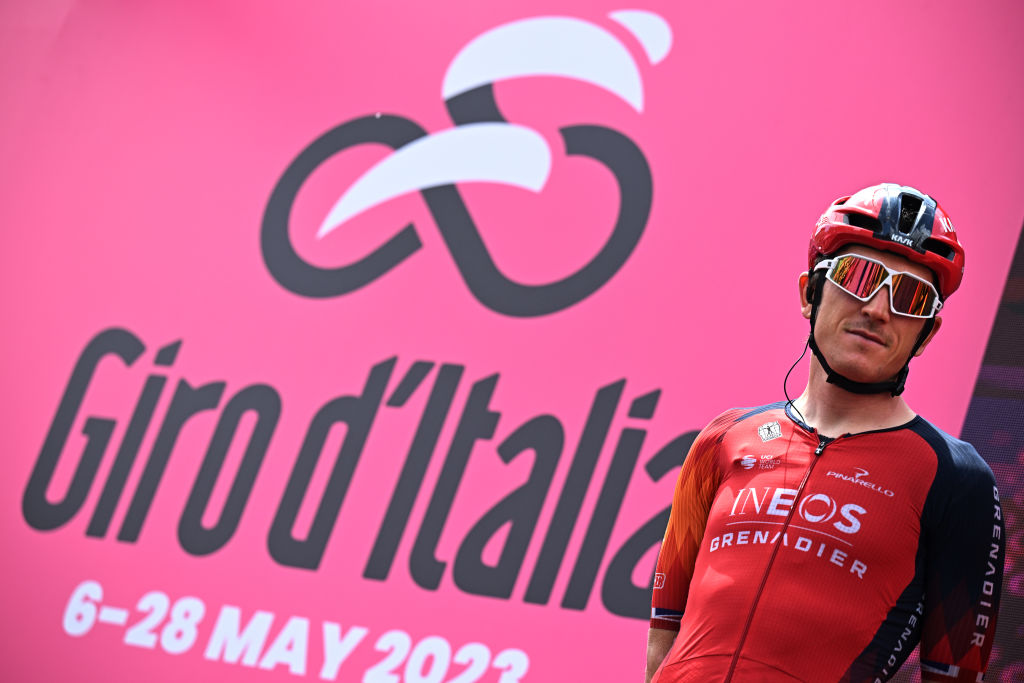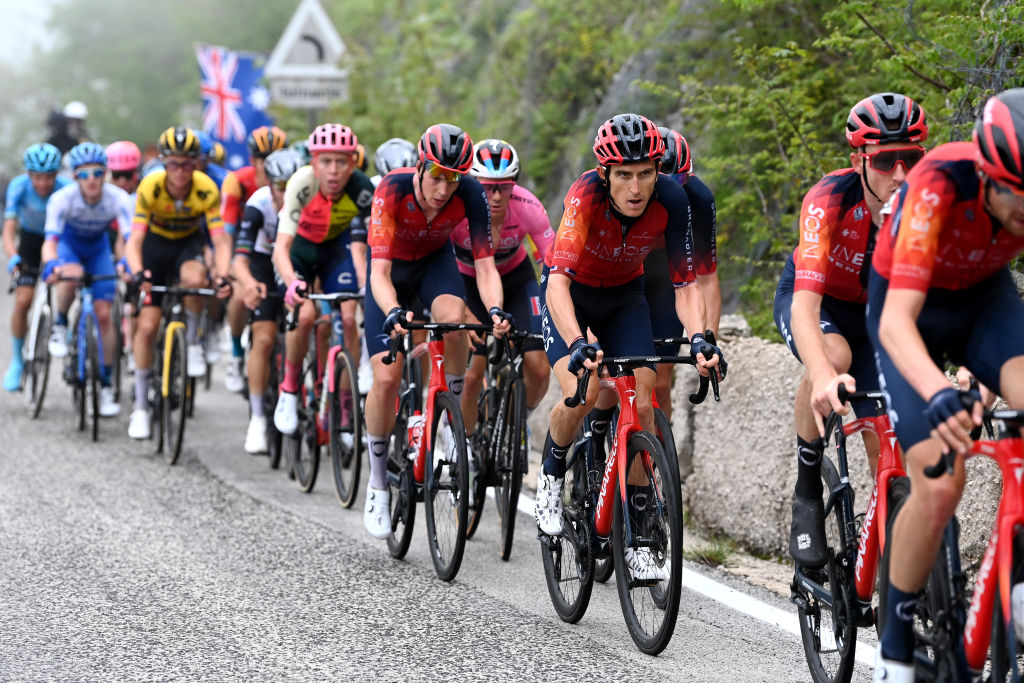Chain problem forces Geraint Thomas into late chase on Giro d'Italia stage 6
'The gears were a bit dodgy all day, but I couldn't change my bike because it was so crazy'

Suffering mechanical mishaps amid speeding Neapolitan traffic is never an experience for the fainthearted, but nothing ever seems to faze Geraint Thomas.
The Welshman certainly betrayed few signs of panic when he was brought to stop by an unshipped chain a dozen or so kilometres outside Naples on stage 6 of the Giro d'Italia.
It helped, of course, that he was able to rely on a deluxe roadside assistance service to ferry him back up to the peloton. After Thomas had righted his chain and remounted, he found three Ineos Grenadiers teammates had waited for him: Salvatore Puccio, Ben Swift and Hour Record holder Filippo Ganna.
The horsepower at Thomas' disposal gave his chase reasonable guarantees of success, but the effort required was no less intense. Ganna's mammoth turns – and, at one point, the proximity of their team car's rear bumper – helped to bring them back into the sanctuary of the peloton with a shade under 7km to go.
Thomas would reach the finish line on Naples' Via Carracciolo at the same time as Remco Evenepoel and the rest of his key rivals, and he remains sixth overall at 1:26.
"The gears were a bit dodgy all day, but I didn't want to change my bike because it was so crazy," Thomas said when he arrived at the Ineos bus on the seafront. "It was ok, but then the chain just came off the front and off the cassette. It took me a while to realise it was off the cassette, but I put it back on.
"After that, the boys were great in getting me back into position. Luckily, I've got strong guys around me. With Swifty, Pippo and Puccio, I had great support."
Get The Leadout Newsletter
The latest race content, interviews, features, reviews and expert buying guides, direct to your inbox!
Thomas wasn't the only general classification contender to endure anxious moments after the Giro had tripped along the headlands of the Amalfi Coast and then sped beneath the shadow of Vesuvius back towards Naples.
Primož Roglič (Jumbo-Visma) was forced into a successful pursuit of his own after a late puncture, but, mercifully, there were no late crashes of the kind that had marred the previous day's finale in Salerno.
"It could have been a lot worse," Thomas said. "At least it was just a chain coming off again and nothing else."
Talking team tactics

At the start in Naples, all eyes had been on Remco Evenepoel, who crashed twice on the road to Salerno, though the world champion's juggling of a football at the signing-on podium on Piazza del Plebiscito seemed to allay most doubts about his fitness.
Even before that interlude, Ineos directeur sportif Matteo Tosatto downplayed the idea that teams would specifically look to test Evenepoel's recovery out on the road. He was speaking from some experience, after all, having helped to shepherd his Saxo leader Alberto Contador successfully in the aftermath of his heavy opening week crash in Castiglione della Pescaia on the 2015 Giro.
"I think Remco won't have problems," Tosatto told Cyclingnews. "I just think it will be another tough day because a lot of riders will be looking to go in the break, and there are a lot of teams who will look to isolate some pure sprinters. Above all, it's a wearying stage at a mental level."
Even so, Ineos were a notable presence at the head of the peloton on the climbs of Valico di Chiunzi and Picco Sant'Angelo, though Thomas explained afterwards that their efforts were about maintaining position rather than applying pressure.
"We knew how technical the descent was to the coast, so we just wanted to be at the front so we could be in control," Thomas said. "You're not going to drop GC riders going at that pace. The main thing was to be in the front and in control again."
Ineos had applied a similar logic on the first mountainous day to Lago Laceno on stage 4, where the team had ridden on the front of the pink jersey group over the final climb of Colle Molella. At first glance, it appeared they might have done so to try to ensure Evenepoel kept the burden of defending the pink jersey, but Tosatto insisted that had not been the case.
"We just decided that in the moment," Tosatto said. "We pulled for 4km, it's not like we did an awful lot. We knew it was a stage that wouldn't make a selection.
"And, unlike what a lot of people said, it wasn't that we were trying to keep Remco in the jersey. That didn't even cross my mind. It was just a small test, and it showed the boys are good."
A bigger test will surely come on stage 7 to Gran Sasso d'Italia, where the last 50km are predominantly uphill and the race climbs to an altitude of 2,000m for the first time. Above all, it will be an examination of Evenepoel's fitness and the depth of his Soudal-QuickStep team, who left him surprisingly isolated at Lago Laceno on Tuesday.
"I don't think it's a very hard stage," Tosatto said. "But it's a stage where the team will be very important."

Barry Ryan was Head of Features at Cyclingnews. He has covered professional cycling since 2010, reporting from the Tour de France, Giro d’Italia and events from Argentina to Japan. His writing has appeared in The Independent, Procycling and Cycling Plus. He is the author of The Ascent: Sean Kelly, Stephen Roche and the Rise of Irish Cycling’s Golden Generation, published by Gill Books.